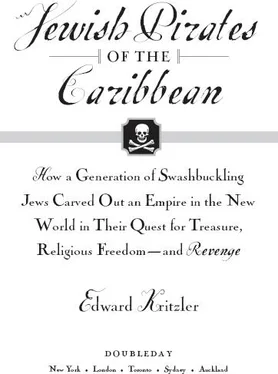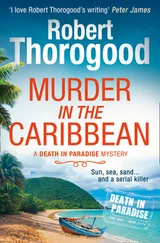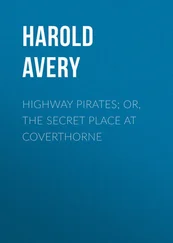Edward Kritzler - Jewish Pirates of the Caribbean
Здесь есть возможность читать онлайн «Edward Kritzler - Jewish Pirates of the Caribbean» весь текст электронной книги совершенно бесплатно (целиком полную версию без сокращений). В некоторых случаях можно слушать аудио, скачать через торрент в формате fb2 и присутствует краткое содержание. Год выпуска: 2008, ISBN: 2008, Издательство: Knopf Doubleday Publishing Group, Жанр: Старинная литература, на английском языке. Описание произведения, (предисловие) а так же отзывы посетителей доступны на портале библиотеки ЛибКат.
- Название:Jewish Pirates of the Caribbean
- Автор:
- Издательство:Knopf Doubleday Publishing Group
- Жанр:
- Год:2008
- ISBN:9780385528368
- Рейтинг книги:3 / 5. Голосов: 1
-
Избранное:Добавить в избранное
- Отзывы:
-
Ваша оценка:
- 60
- 1
- 2
- 3
- 4
- 5
Jewish Pirates of the Caribbean: краткое содержание, описание и аннотация
Предлагаем к чтению аннотацию, описание, краткое содержание или предисловие (зависит от того, что написал сам автор книги «Jewish Pirates of the Caribbean»). Если вы не нашли необходимую информацию о книге — напишите в комментариях, мы постараемся отыскать её.
Jewish Pirates of the Caribbean — читать онлайн бесплатно полную книгу (весь текст) целиком
Ниже представлен текст книги, разбитый по страницам. Система сохранения места последней прочитанной страницы, позволяет с удобством читать онлайн бесплатно книгу «Jewish Pirates of the Caribbean», без необходимости каждый раз заново искать на чём Вы остановились. Поставьте закладку, и сможете в любой момент перейти на страницу, на которой закончили чтение.
Интервал:
Закладка:
Two years before, Columbus, sailing south of Trinidad, had sighted the continent’s northern coast, but did not land. Observing the four mouths of the Orinoco River that emptied into the Gulf of Paria, the admiral, with one foot planted firmly in the Bible and the other in Renaissance science, declared them the four rivers flowing out of the Garden of Eden. 6
Cabral sailed north along the coast to a protected harbor he named Porto Segua (Safe Port). Suppressing his belief that he was trespassing on lands reserved for Spain, he stuck a wooden cross in the earth and carved on it the arms of Portugal. As it was Sunday, he celebrated Mass and handed out little tin crosses to the natives. 7The following day Mestre João aligned the sun with his astrolabe to determine their latitude. His measurement of 17 degrees south was off by only a half degree. In his report to the king (unpublished for five centuries), the physician included drawings of the Southern Cross and adjacent constellations. Brazil had been discovered.
João shared his observations with Gaspar. Expert in nautical matters, the two conversos judged it a new continent. Cabral was not so sure: “We remained in ignorance,” he wrote, “whether it was an island or a mainland, though we are inclined to the latter opinion.” In a rush to get back on course, after five days he headed for southern Africa. His intention was to sail in the wake of da Gama, circumvent the continent, and proceed up the coast until he caught the trade winds to India. A simple plan, but owing to heavy storms and the poor skills of his captains, six ships were lost rounding Africa, and Cabral arrived in India with half his original fleet.
This time around, the Hindu Rajah Samorin, pleased by the foreigners’ more generous offerings, greeted the Portuguese warmly. For a while all went well—too well, according to competing Muslim merchants. Cabral was given a warehouse to store his trade goods and nearby quarters for his men. But the Muslim merchants gathered a mob to attack the crew’s quarters and loot the warehouse, killing many sailors and forcing the rest to retreat to their ships.
When informed of the action, Samorin did nothing. Gaspar, who had commanded Samorin’s navy, advised swift retribution. Heeding his pilot’s counsel, Cabral
ordered ten Moorish ships in the port to be taken and all the people in the said ships to be killed. Thus we slew 500 and captured 20 or 30 hiding in the holds of the ships…One ship had three elephants which we killed and ate; we unloaded and burned the ships; and the following day we bombarded the city, so that we slew an endless number of people and did much damage. 8
As evident from the notary’s account, the temperament of the explorer was little different from that of a conquistador. If peaceful means did not bring the desired result, terror was the alternative. Cabral, having journeyed thousands of miles for spices, silks, and jewels, was not to be put off by recalcitrant rulers or angry locals—and when his men were hungry, elephant meat would do. After Calicut’s devastation, Gaspar recommended they head south to Cochin, whose ruler hated Samorin. With the renegade Jew smoothing the way, the rival rajah and Cabral concluded a trade treaty that laid the foundation of Portuguese rule in India. On a palm leaf, inscribed with an iron pen, Cochin’s ruler wrote King Manuel: “My country is rich in cinnamon, cloves, ginger and pepper. That which I ask of you in exchange is gold, silver, corals and scarlet cloth.” 9Cabral departed with the holds of his ships loaded with pepper, cinnamon, fine cottons, silks, and perfumes. 10
Homeward bound, Cabral stopped off at Cape Verde to take on provisions. A chance encounter there with a Portuguese fleet on another voyage of discovery resulted in Gaspar’s meeting an Italian explorer whose name would become synonymous with the continent to which Gaspar directed him.
When the crews met and conversed, Gaspar shared his knowledge of the southern continent with the fleet’s adviser, Amerigo Vespucci, who had previously explored the continent’s northern coast for Spain two years before when he sailed with Alonso de Ojeda, one of Columbus’s captains. When Amerigo reported his find to Ferdinand, he expected the king to sponsor a return voyage. But although he was a trusted friend of Columbus, Vespucci was a foreigner, and preference was given to the proposals of Spanish explorers. Shunted aside, Amerigo turned his back on Spain. Having noted that his landfall on the continent might have fallen on Portugal’s side of the pope’s dividing line, he approached the Portuguese court. King Manuel, intrigued with the idea of a new land and having not yet received news of Cabral’s discovery, authorized an expedition to investigate further and sent the Italian along as adviser.
So it was that Amerigo and Gaspar happened to meet in Cape Verde, and as a result the Italian’s name would one day be attached to Columbus’s discoveries. According to Vespucci’s biographer, the Jewish pilot possessed “a storehouse of geographical knowledge and [was] an incomparable source of information for Amerigo who could discuss hundreds of things with him in Italian.” Amerigo soon took command of the fleet, and reaching the continent explored nearly a thousand miles of coastline as far south as Río de la Plata.
On his return to Lisbon, he confirmed the continent’s massive size and asserted that much of its coastal land was indeed “over the line.” Although sailing for Portugal, the loyal Italian wrote his Florentine patron, Lorenzo de’ Medici, that he had not reached Asia but had discovered a “New World.” He also praised Gaspar as “the best informed man among Cabral’s followers…a trustworthy man who speaks many languages and knows many towns and provinces from Portugal to the Indian Ocean, from Cairo to the island of Sumatra.” 11The popularity of his account of these discoveries led a young German cartographer named Martin Waldseemüller to label the southern continent “the land of Amerigo,” and by 1528 Columbus’s Indies were known as the Americas. 12

Gaspar’s own story ends back in India. In 1502, he and his godfather, Vasco da Gama, sailed once more to the subcontinent. On this occasion, he reunited with his wife, who, having escaped from Calicut after the attack, was living in Cochin. Gaspar tried to persuade her to convert so that she could return with him to Portugal, but being a devout Jewess and learned in the Law, she adamantly refused.
After Samorin’s demise, Gaspar settled in Calicut in 1505 in service to the Portuguese viceroy. (In 1511, Goa was conquered and became the capital of Portugal’s Indian empire.) He often visited his wife, but she never forgave him for turning Christian. Such were the life and adventures of the Jewish pilot who, as Vasco da Gama wrote, “shed his faith with the ease of a reptile.” 13
CAPITALIST PIONEER
A small, fertile island off the northeast coast of South America that Amerigo Vespucci called “a natural wonder” bears the name of Fernando de Noronha, a sixteenth-century converso who headed the first capitalist venture in the New World.
King Manuel, excited by Vespucci’s report of coastal forests of brazilwood, which was the source of a valuable red dye in demand throughout Europe, drew up a royal contract with the wealthy shipowning merchant Fernando de Noronha. With the likelihood of also finding valuable spices and other marketable commodities, Noronha recruited other prominent conversos to join his consortium in partnership with the king. Beyond a good business opportunity, however, their interest in the far-off land was to find a refuge to live free from persecution.
Читать дальшеИнтервал:
Закладка:
Похожие книги на «Jewish Pirates of the Caribbean»
Представляем Вашему вниманию похожие книги на «Jewish Pirates of the Caribbean» списком для выбора. Мы отобрали схожую по названию и смыслу литературу в надежде предоставить читателям больше вариантов отыскать новые, интересные, ещё непрочитанные произведения.
Обсуждение, отзывы о книге «Jewish Pirates of the Caribbean» и просто собственные мнения читателей. Оставьте ваши комментарии, напишите, что Вы думаете о произведении, его смысле или главных героях. Укажите что конкретно понравилось, а что нет, и почему Вы так считаете.












